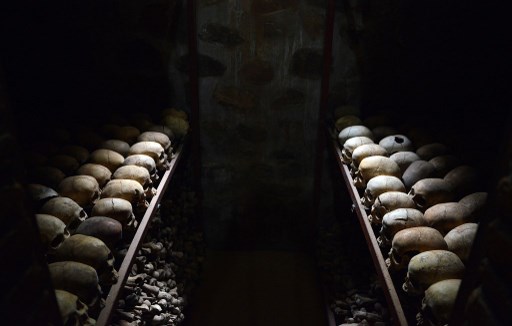
A Rwandan genocide suspect who fled to France after the mass killings in 1994 and started a new life under a false identity will become the latest person on Wednesday to be tried abroad over the slaughter of an estimated 800,000 people.
Philippe Hategekimana, who obtained French citizenship under the name Philippe Manier, will be tried by a Paris court for genocide and crimes against humanity.
AFP looks at the global push to ensure those responsible for the mass killings of Rwandan Tutsis are brought to justice:
– International Criminal Tribunal for Rwanda –
The International Criminal Tribunal for Rwanda (ICTR) was set up by the United Nations in 1994 in the Tanzanian city of Arusha just months after the April-June genocide.
In September 1998 it became the first international tribunal to hand down a conviction for genocide. The court issued dozens of rulings, from life sentences to acquittals, before closing in late 2015.
Its work was taken over by the UN’s International Residual Mechanism for Criminal Tribunals (MICT) in Arusha and in the Dutch capital of The Hague.
In September 2022, one of Rwanda’s richest men before the genocide, Felicien Kabuga, who also moved to France under a false identity after the slaughter, went on trial in the Hague.
Kabuga is accused of setting up hate media that urged ethnic Hutus to kill rival Tutsis and supplying death squads with machetes. His trial was put on hold in March amid concerns over his health.
– Rwandan justice –
Rwanda started trying genocide suspects in 1996, and on a single day in April 1998 had 22 of them executed by firing squad.
It abolished the death penalty in 2007, lifting the main obstacle for the ICTR to extradite genocide suspects to Rwanda for trial.
Between 2005 and 2012, more than 12,000 “gacaca” community-based courts put nearly two million people on trial and convicted 65 percent, sending most to prison.
– Western courts –
– BELGIUM:
The first case in Europe was held in Belgium, the former colonial power in Rwanda, where two nuns were convicted in 2001 of complicity in the massacre of up to 6,000 Tutsis who had taken shelter at their convent.
Several senior figures from the Hutu regime behind the slaughter were also put on trial.
They include a former Rwandan army major who was convicted over the murders of 10 Belgian peacekeepers, a former bank manager dubbed the “genocide banker” who was sentenced to 30 years in prison for murders and rapes, and a former senior government official who was the first person ever to be convicted of the crime of genocide in Belgium in 2019.
– FRANCE:
In France, which was for years accused of shielding Rwandan genocide suspects, the first trial only took place in 2014 when a former spy chief was sentenced to 25 years in prison.
Two years later, the former mayors of two Rwandan villages were sentenced to life imprisonment over killings in their localities.
Four cases in total have gone to court in France.
The highest-ranking person to be convicted was Laurent Bucyibaruta, a former governor of Gikongoro province who was given a 20-year jail sentence last year for complicity in genocide and crimes against humanity.
– OTHER COUNTRIES:
A dozen or so convictions have been handed down in Sweden, Finland, Norway, Germany, the Netherlands, the United States and Canada.
AFP





